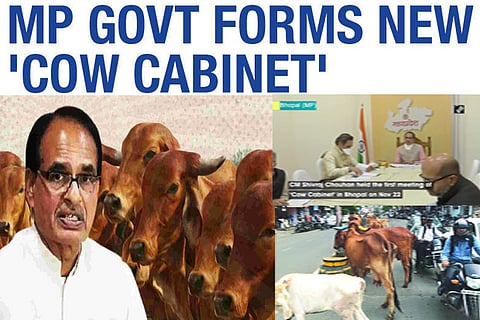

Chennai
He had recently announced that the state government will constitute a Cow Cabinet for the conservation and promotion of the bovine animal in the region. The stakeholders in this Cabinet will include representation from the Animal Husbandry, Forest, Panchayat and Rural Development apart from Home and Farmers Welfare Department.
The constitution of a Cabinet dedicated solely to the preservation of an animal that is not even on an endangered list, may be a matter of amusement to those living outside the state. But Madhya Pradesh has quite a chequered history when it comes to the rights of the animal considered sacred as per Hindu scriptures. Just last year, the state, taking cognisance of the number of violent acts that were being perpetrated by the self-appointed gau rakshaks or guardians of the cow, passed the Anti-Cow Slaughter Amendment Act 2019, which entailed a fine of Rs 25,000 to Rs 50,000 and a jail term of six months to three years for those convicted of committing violence in the name of the cow.
The original Act from 2004 had prohibited the transport of cattle through Madhya Pradesh and mandated the seeking of special permission from the government for those choosing to do so. These developments must be considered in the context of the political shifts that have taken place in the nation over the past decade. A Reuters report had revealed that between 2010 and 2017, as many as 63 cow vigilante attacks had taken place in India, which has led to 28 fatalities and 124 casualties. The NGO Human Rights Watch has said that a surge in cow vigilante violence was reported since 2015 when the NDA-led government came into power a year earlier. In 2017, in response to the numerous cases of cow-vigilantism that were reported across the country, a 16-city strong movement called Not in My Name was mobilised to protest against these violations perpetrated against both members of the minority community as well as Dalit individuals in India. However, the protection of marginalised individuals is not a job that must be entrusted to non-governmental organisations.
The very fact that an Indian can be discriminated in his or her own country on account of his community, sect, religion or caste, or in this case, his choice of meat, is a matter of national shame. Adding insult to injury is the fact that specific state governments are setting aside human rights in favour of animal rights, and doing so with absolute impunity. Maybe it’s time for the Centre to form committees to address these deviations in normative social behaviour, and work harder towards protecting human life instead.
Visit news.dtnext.in to explore our interactive epaper!
Download the DT Next app for more exciting features!
Click here for iOS
Click here for Android